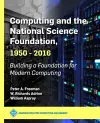
Computing and the National Science Foundation, 1950-2016
3 authors - Paperback
£37.76 was £41.95
Peter A. Freeman, a computer scientist (Carnegie Mellon University, 1970), was the seventh AD/CISE from 2002–2007 and DD/CCR from 1987–1989. Previously he held faculty positions at the University of California, Irvine and Georgia Tech, where he was Founding Dean of Computing in 1990. After NSF he returned to Georgia Tech as Emeritus Dean and Professor and was an active consultant with the Washington Advisory Group. While in academe he was an active researcher, educator, and participant in professional society activities. He is a fellow of the ACM, AAAS and IEEE. W.
Richards "Rick" Adrion is Professor Emeritus of Computer Science at the University of Massachusetts Amherst. He continues to be an active researcher in software engineering and computer science education, leading several large NSF projects during his career. He served as an NSF program director from 1976–1978 and 1980–1986, a division director from 2000–2002, and a CISE senior scientist in 1986 and 2002–2003. He held full-time positions at the University of Texas at Austin, Oregon State, and the National Bureau of Standards, as well as consulting, part-time, and visiting positions at a number of not-for-profit organizations, corporate labs, and universities here and abroad. He is a fellow of the ACM and AAAS.
William Aspray is Professor of Information Science at the University of Colorado Boulder. He is trained as a historian of science and has spent most of his career studying the histories of computing, information, mathematics, and electrical engineering. He formerly taught at Harvard University, Indiana University Bloomington, University of Pennsylvania, University of Texas at Austin, Virginia Tech, and Williams College, and served in leadership positions at the Charles Babbage Institute, Computing Research Association, and IEEE History Center. He led a history of computing project at NSF in the early 1990s, and he has published three articles and a book about NSF computing activities (Participation in Computing: The National Science Foundation's Expansionary Programs, Springer, 2016).